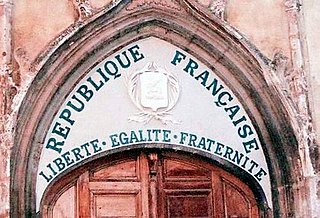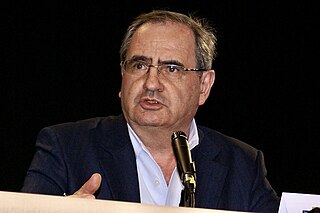
Islamism is a concept whose meaning has been debated in both public and academic contexts. The term can refer to diverse forms of social and political activism advocating that public and political life should be guided by Islamic principles or more specifically to movements which call for full implementation of sharia. It is commonly used interchangeably with the terms political Islam or Islamic fundamentalism. In academic usage, the term Islamism does not specify what vision of "Islamic order" or sharia are being advocated, or how their advocates intend to bring them about. In Western mass media it tends to refer to groups whose aim is to establish a sharia-based Islamic state, often with implication of violent tactics and human rights violations, and has acquired connotations of political extremism. In the Muslim world, the term has positive connotations among its proponents.
Secularism, as defined in the Merriam-Webster dictionary, is the "indifference to, or rejection or exclusion of, religion and religious considerations". In certain context, the word can refer to anticlericalism, atheism, desire to exclude religion from social activities or civic affairs, banishment of religious symbols from the public sphere, state neutrality toward religion, the separation of religion from state, or disestablishment.

Laïcité, literally "secularity", is a French concept of secularism. It discourages religious involvement in government affairs, especially religious influence in the determination of state policies; it also forbids government involvement in religious affairs, and especially prohibits government influence in the determination of religion. Laïcité does not preclude a right to the free exercise of religion.
Qutbism is an Islamist ideology developed by Sayyid Qutb, a leading member of the Muslim Brotherhood who was executed by the Egyptian government. It has been described as advancing the extremist jihadist ideology of propagating "offensive jihad" – waging jihad in conquest – or "armed jihad in the advance of Islam".

Islamic terrorism, Islamist terrorism or radical Islamic terrorism are terrorist acts against civilians committed by violent Islamists who claim a religious motivation.

Gilles Kepel, is a French political scientist and Arabist, specialized in the contemporary Middle East and Muslims in the West. He is Professor at the Université Paris Sciences et Lettres (PSL) and director of the Middle East and Mediterranean Chair at PSL, based at Ecole Normale Supérieure. He has been described by Alain Elkann as “the best possible guide through the frightening labyrinth of militant Islam.”

The Algerian Civil War was a civil war in Algeria fought between the Algerian Government and various Islamic rebel groups from 26 December 1991 to 8 February 2002. The war began slowly as it first appeared the government had successfully crushed the Islamist movement, but armed groups emerged to fight jihad and by 1994, violence had reached such a level that it appeared the government might not be able to withstand it. By 1996–97 however it became clear that the violence and predation of the Islamists had lost its popular support, although fighting continued for several years after.

Islamization, Islamicization or Islamification is the process of a society's shift towards Islam, such as found in Sudan, Pakistan, Iran, Malaysia, or Algeria. In contemporary usage, it may refer to the perceived imposition of an Islamist social and political system on a society with an indigenously different social and political background.
The term Afghan Arabs refers mostly to Arab and other Muslim Islamist mujahideen who came to Afghanistan during and following the Soviet–Afghan War to help fellow Muslims fight Soviets and pro-Soviet Afghans.

Talal Asad is an American cultural anthropologist at the Graduate Center of the City University of New York. Asad has made important theoretical contributions to postcolonialism, Christianity, Islam, and ritual studies and has recently called for, and initiated, an anthropology of secularism. Using a genealogical method developed by Friedrich Nietzsche and made prominent by Michel Foucault, Asad "complicates terms of comparison that many anthropologists, theologians, philosophers, and political scientists receive as the unexamined background of thinking, judgment, and action as such. By doing so, he creates clearings, opening new possibilities for communication, connection, and creative invention where opposition or studied indifference prevailed".

The term "Jihadism" is a 21st-century neologism found in Western languages to describe Islamist movements perceived as military movements "rooted in Islam" and "existentially threatening" to the West. It has been described as a "difficult term to define precisely", because it remains a recent neologism with no single, generally accepted meaning. The term "jihadism" first appeared in South Asian media; Western journalists adopted it in the aftermath of the September 11 attacks of 2001. It has since been applied to various insurgent and terrorist movements whose ideology is based on the Islamic notion of jihad.

Pierre Rosanvallon is a French intellectual and historian, named professor at the Collège de France in 2001. He holds there the chair in modern and contemporary political history. His works are dedicated to the history of democracy, French political history, the role of the state, and the question of social justice in contemporary societies. He is also director of studies at the École des hautes études en sciences sociales, where he led the Raymond Aron Centre of Political Researches between 1992 and 2005. Rosanvallon was in the 1970s one of the primary theoreticians of workers' self-management in the French Democratic Confederation of Labour (CFDT) trade union.
Jean-Pierre Azéma is a French historian.

Secularism has been a controversial concept in Islamic political thought, owing in part to historical factors and in part to the ambiguity of the concept itself. In the Muslim world, the notion has acquired strong negative connotations due to its association with removal of Islamic influences from the legal and political spheres under foreign colonial domination, as well as attempts to restrict public religious expression by some secularist nation states. Thus, secularism has often been perceived as a foreign ideology imposed by invaders and perpetuated by post-colonial ruling elites, and understood as equivalent to irreligion or antireligion.

Salafi jihadism or jihadist-Salafism is a transnational religious-political ideology based on a belief in "physical" jihadism and the Salafi movement of returning to what adherents believe to be true Sunni Islam.

Bruno Étienne was a French sociologist, freemason and a political analyst. He was a specialist of Algeria, Islam and anthropology of the religious and masonic fact.

Raphaël Liogier is a French sociologist and philosopher. He received his Phd in Social Sciences at the University Paul Cézanne (Aix-Marseille) in France, where he also received a master's degree in Public Law and a master's degree in Political Science. Other degrees include a degree in Philosophy from the University of Provence, and a Masters of Science (MSC) by Research in Philosophy from the University of Edinburgh in Scotland. Liogier has also studied social sciences as a visiting undergraduate at the University of California at Berkeley.

Jamaat-e-Islami is an Islamist political and right-wing Muslim nationalist movement founded in 1941 in British India by the Islamist theologian and socio-political philosopher, Abul Ala Maududi. Along with the Muslim Brotherhood, founded in 1928, Jamaat-e-Islami was one of the original and most influential Islamist organisations, and the first of its kind to develop "an ideology based on the modern revolutionary conception of Islam".
Islamo-leftism, adjectivally Islamo-leftist, is a neologism applied to the alleged political alliance between leftists and Islamists.
Stéphane François is a French political scientist and a specialist of radical right-wing movements, as well as conspiracy theories, political ecology and countercultures.











